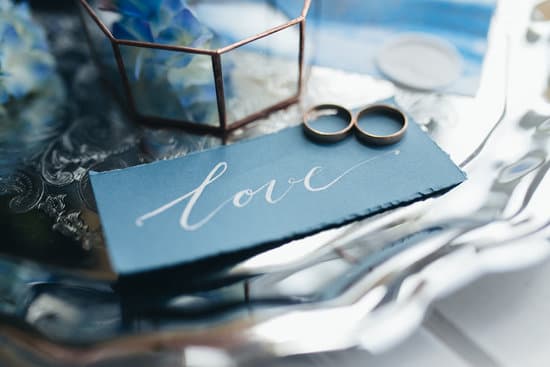The significance of a wedding band is deeply ingrained in the cultural and historical traditions of marriage. Many individuals cherish the symbolism of this timeless piece of jewelry, which represents love, commitment, and unity. However, a common question that arises is whether it is acceptable to wear a wedding band before the actual wedding ceremony.
Can I wear a wedding band before the wedding? This article aims to explore this question and provide insight into the various perspectives and considerations surrounding this topic.
Throughout history, there have been traditional etiquettes and customs regarding the wearing of a wedding band before the wedding. These customs often vary based on cultural and religious beliefs, adding further complexity to the topic.
In this article, we will delve into these traditional norms and shed light on their historical significance. Additionally, we will take a closer look at modern perspectives on this matter and discuss why some individuals may choose to wear their wedding band before their official nuptials.
It is essential to consider that wearing a wedding band before the actual wedding ceremony can be seen as a personal choice for many individuals. Communication between partners about their individual preferences regarding this matter is crucial in promoting understanding and respect for each other’s beliefs. As we explore different cultural and religious considerations on this topic, it becomes evident that there are diverse perspectives that can influence one’s decision regarding wearing a wedding band before the wedding.
Furthermore, practical considerations such as sizing, comfort, and daily wear should also be taken into account when making this decision. Throughout this article, readers will find valuable insights and tips for making an informed decision based on their own values and beliefs.
Traditional Wedding Band Etiquette
Wearing a wedding band is a significant and symbolic gesture that represents love, commitment, and unity between partners. Traditionally, the wedding band is not typically worn before the actual wedding ceremony. In many cultures and societies, it is considered bad luck to wear the wedding band before the official union takes place. This traditional etiquette has been upheld for centuries and is deeply rooted in historical and cultural significance.
The tradition of not wearing a wedding band before the wedding dates back to ancient times when rings were used as a symbol of ownership or commitment in marriage contracts. Over time, this symbolism evolved to represent eternal love and partnership. The act of exchanging wedding bands during the marriage ceremony became a universal tradition symbolizing the couple’s commitment to each other.
While traditional etiquette suggests refraining from wearing a wedding band before the actual wedding, modern perspectives on this matter have begun to shift. Some individuals choose to wear their wedding bands prior to the ceremony as a personal choice or due to practical considerations such as sizing or comfort. Additionally, there are instances where couples may choose to exchange their rings privately before their official ceremony as a symbol of their commitment to one another.
Ultimately, whether or not one chooses to wear a wedding band before the wedding is a personal decision that varies across different cultures, religions, and individuals. It is important for couples to communicate openly about their preferences regarding this matter and make an informed decision based on their own values and beliefs.
Modern Perspectives
Wearing a wedding band before the wedding is a topic that has become increasingly relevant in modern times. While traditional etiquette may dictate that the wedding band should only be worn after the official marriage ceremony, many individuals are choosing to deviate from this norm. Modern perspectives on wearing a wedding band before the wedding vary widely and are influenced by personal beliefs, cultural influences, and practical considerations.
In contemporary society, some individuals view wearing a wedding band before the wedding as a symbol of their commitment to their partner even before the official marriage ceremony takes place. For these individuals, it serves as a tangible reminder of their impending union and can also symbolize their readiness for marriage. Additionally, some couples may choose to wear matching bands as a way of expressing their unity and commitment to one another prior to the wedding day.
On the other hand, there are those who hold the belief that it is more appropriate to wait until after the marriage ceremony to begin wearing a wedding band. For these individuals, the act of exchanging rings during the wedding holds significant symbolic value and they prefer not to diminish its importance by wearing the ring beforehand.
It’s important for partners to have open and honest communication about their stance on this issue – it’s often best to come to an agreement whether or not both wear them before official ceremony.
When considering whether to wear a wedding band before the wedding, it’s essential for individuals to take into account their own personal beliefs and values along with any cultural or religious traditions that may influence their decision. Ultimately, regardless of modern perspectives on this matter, what matters most is that both partners are comfortable with whatever choice they make regarding wearing their wedding bands prior to getting married.
| Aspect | Description |
|---|---|
| Modern Perspectives | Vary based on individual beliefs, cultural influences, and practical considerations |
| Open Communication | Ideal for partners in order for both parties are comfortable with whatever choice they make. |
Symbolism of the Wedding Band
Wearing a wedding band before the actual wedding ceremony is a topic that sparks much debate and contemplation. Understanding the symbolism behind the wedding band can shed light on the significance of wearing it before the wedding day.
The wedding band represents love, commitment, and unity, serving as a constant reminder of the vows exchanged between partners. Before delving into the decision of wearing a wedding band before the wedding, it’s important to recognize the deep emotional significance attached to this cherished piece of jewelry.
The symbolism behind the wedding band holds immense value in various cultures and traditions. From ancient civilizations to modern-day societies, the circular shape of the band symbolizes eternity and unending love. The unbroken circle reflects the idea of eternal commitment and never-ending devotion between partners. This powerful symbolism reinforces why some individuals may choose to wear their wedding bands prior to their official marriage ceremony.
In considering whether to wear a wedding band before the wedding, understanding its symbolic representation ties back to personal beliefs and values. Family customs, cultural background, and religious practices can also influence an individual’s decision regarding wearing a wedding band prior to marriage.
For some, wearing a wedding ring beforehand is a way to honor these traditions while embracing its deeper meaning. Ultimately, recognizing the symbolism of the wedding band provides insight into why some individuals feel compelled to wear it before their official union in marriage.
- The symbolic representation of a never-ending circle
- Cultural significance
- Influence on personal beliefs and values
Personal Choice
Wearing a wedding band before the actual wedding is a personal choice that many individuals have different perspectives on. Some may feel strongly about following traditional etiquette, while others may see it as a practical and meaningful decision. Ultimately, the choice to wear a wedding band before the wedding should be based on an individual’s values and beliefs, as well as open communication with their partner.
When it comes to this personal choice, there are several factors to consider:
- Meaningful Symbolism: For some individuals, wearing a wedding band before the wedding can symbolize their commitment and love for their partner even before the official ceremony takes place.
- Practicality: Those who choose to wear a wedding band before the wedding may do so for practical reasons such as ensuring that the ring fits properly or getting used to wearing jewelry regularly.
- Cultural and Religious Factors: Cultural and religious traditions can also play a significant role in whether wearing a wedding band before the wedding is acceptable. It’s important for individuals to consider their own cultural or religious background when making this decision.
Ultimately, whether one should wear a wedding band before the actual ceremony is a deeply personal decision that should be made thoughtfully considering one’s own values, beliefs, and practical considerations. Open communication between partners can also facilitate understanding and mutual respect for each other’s choices regarding this matter.
Cultural and Religious Considerations
Influence of Cultural Traditions
Cultural traditions play a significant role in the decision to wear a wedding band before the wedding. In some cultures, it is customary for couples to exchange wedding bands during an engagement ceremony, while in others, the exchange of rings occurs at the wedding ceremony itself. Understanding the cultural significance of wearing a wedding band before the wedding is important for individuals who come from diverse cultural backgrounds.
Religious Beliefs
Religious beliefs also influence whether individuals choose to wear a wedding band before the wedding. For example, in some Christian traditions, wearing a ring as a sign of commitment may be encouraged prior to the official wedding ceremony, while in other religious practices, there may be specific guidelines regarding when and how a couple should exchange rings.
It is important for engaged individuals to consider their religious beliefs and consult with their spiritual leaders if they have questions about wearing a wedding band before the wedding.
Respect for Tradition
For many couples, respecting cultural and religious traditions is an integral part of their decision-making process when it comes to wearing a wedding band before the wedding. Whether it involves seeking blessings from elders in accordance with cultural customs or obtaining approval from religious authorities, honoring tradition can be an essential consideration. Additionally, some individuals may find comfort and meaning in following longstanding cultural or religious practices associated with marriage and symbolized by wearing the wedding band.
Practical Considerations
When it comes to the practical considerations of wearing a wedding band before the wedding, there are several factors to take into account. One of the most important practical considerations is sizing. Ensuring that your wedding band fits properly is crucial, especially if you plan to wear it before the wedding day. It’s essential to have the correct size to prevent any discomfort or potential loss of the ring.
Another practical consideration is comfort. If you choose to wear your wedding band before the wedding, it’s important to assess how comfortable it feels on your finger. You can wear it for short periods initially and gradually increase the duration to gauge its comfort level. Additionally, consider your daily activities and whether wearing a ring could potentially interfere with them.
For those who are considering wearing a wedding band before the wedding, daily wear is another practical consideration. If you lead an active lifestyle or work in an environment where wearing jewelry could pose a risk, it’s essential to weigh these factors before making a decision. Assessing how the ring may impact your daily routine can help determine whether wearing it before the wedding is feasible for you.
Conclusion
In conclusion, the decision to wear a wedding band before the wedding is ultimately a personal one, influenced by tradition, modern perspectives, symbolism, personal choice, cultural and religious considerations, and practicality. While traditional etiquette may discourage wearing the wedding band before the wedding, modern perspectives and personal preferences have shifted this perspective for many individuals. The symbolism of the wedding band as a representation of love and commitment adds emotional significance to this decision.
It is important for couples to communicate openly about their individual preferences regarding wearing a wedding band before the wedding. Ultimately, it is crucial to make an informed decision based on one’s own values and beliefs. Whether influenced by cultural traditions or personal choice, the significance of the wedding band as a symbol of unity and commitment remains constant.
As attitudes continue to evolve around this topic, it is clear that there is no one-size-fits-all answer. Each individual’s circumstances can influence their decision when it comes to wearing a wedding band before the wedding. It is essential for individuals to consider all perspectives and make a decision that aligns with their own beliefs and values.
Frequently Asked Questions
Is It Okay to Wear Your Wedding Band Before the Wedding?
It is a personal choice whether to wear your wedding band before the wedding. Some people may feel strongly about waiting until after the ceremony, while others may be comfortable wearing it beforehand as a symbol of commitment.
Can I Wear a Wedding Band if I Not Married?
Traditionally, wearing a wedding band is a symbol of marriage. However, some people may choose to wear a band as a fashion accessory or as a symbol of their commitment to a partner even without being legally married. Ultimately, it depends on personal beliefs and customs.
Is It Okay to Just Wear a Wedding Band?
It is perfectly okay to just wear a wedding band if that is your preference. Some individuals may not want an engagement ring or other jewelry, and may simply choose to wear a wedding band as their primary or only piece of jewelry to represent their marital status.

I have been involved in marriages for over 20 years helping couples and singles understand more about them.





